
Slowly but surely, we proceed: According to my calculations, far from being accurate, we should be a handful of km away from the 2.000 milestone. In 70 km we’ll celebrate!
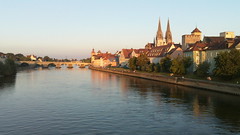 Regensburg is too beautiful to be described by words. Don’t miss it if you can, I’ll never be able to tell you its true essence. You have to see and possibly live it: It’s special. This is our fourth day of navigation along the Danube, more than 180 km. The water is very clean, the current variable between 2 and 7 km per hour.
Regensburg is too beautiful to be described by words. Don’t miss it if you can, I’ll never be able to tell you its true essence. You have to see and possibly live it: It’s special. This is our fourth day of navigation along the Danube, more than 180 km. The water is very clean, the current variable between 2 and 7 km per hour.
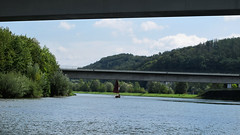 The river sides are mostly embanked and covered by stones, “rip-rap” is the correct English term (as I’m told by Andrea who’s the expert), not allowing the river to flow the way it wants and to create its own path. Sad to see. There’re some beaches and oxbow lakes left, way better than the Rhine and the most part of the Main.
The river sides are mostly embanked and covered by stones, “rip-rap” is the correct English term (as I’m told by Andrea who’s the expert), not allowing the river to flow the way it wants and to create its own path. Sad to see. There’re some beaches and oxbow lakes left, way better than the Rhine and the most part of the Main.
However we still feel like being in a large, beautiful canal rather than in a river.
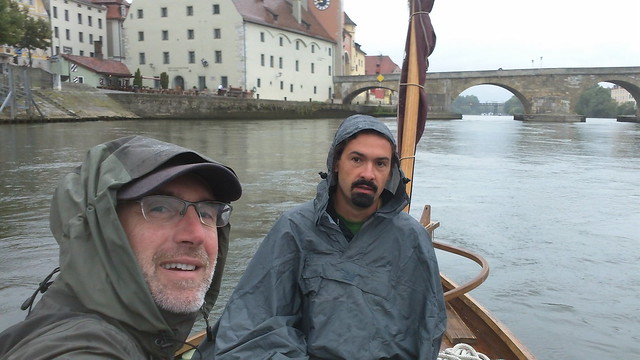
We sat sails three days ago from Regensburg with Andrea Goltara, general manager of CIRF (Italian Centre for River Restoration) who’s now become a Man on the River. Obviously, the mass of information that he’s given us would deserve more room.
The departure day, on August 28th, didn’t look any good, although the wind was on our side. We pass very fast under the Stone Bridge, then after a few km the wind turns back on our nose!
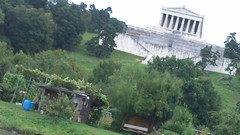 We approach the Valhalla, building madness by Ludwig I: It’s a Greek temple in the Bavarian forests. Not an everyday sight, I would say. We much more appreciate a tiny house with its own veggies garden, placed on the river banks just under the white temple (one of the greatest eco-monsters in history).
We approach the Valhalla, building madness by Ludwig I: It’s a Greek temple in the Bavarian forests. Not an everyday sight, I would say. We much more appreciate a tiny house with its own veggies garden, placed on the river banks just under the white temple (one of the greatest eco-monsters in history).
What kind of substances was Ludwig used to assume? As the good Viking I am, I’d rather prefer the Valhalla to keep being an ethereal thing reserved to warrior’s afterlife, a dream and not a hard, tridimensional, huge thing. There was some fighting here too, to build this monument, but between man and nature. The Valhalla!? A total crap.
After that, as expected, the Gods unleash their wrath upon us: The wind gets stronger and it rains. As you already know very well, rain aboard Clodia means a very hard time ahead.
Dark, low and fast clouds brush our heads and for a few kilometers we proceed slowly, headwind.
Andrea is very good at rowing. After the 36°C of the previous day, we’re now dropped to 14°C! In the evening, the sky clears up and we stop before Straubing’s lock. The sunset is wonderful and we have lentils and rice aboard.
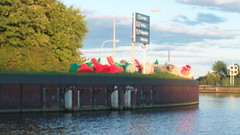 The next morning is sunny and windy, but the wrong way! We don’t feel much the 60 km covered yesterday, and the current eventually helps us. We still see embankments and concrete: How against nature, as well as the walls that we find in Pfelling, when we stop for a rest. Proudly (as you can tell by the many pictures hanging in the local shops) the locals, on top of building many houses close to the river banks, have thought: “Why can’t we just get rid altogether of the river floods, by building a huge wall?”
The next morning is sunny and windy, but the wrong way! We don’t feel much the 60 km covered yesterday, and the current eventually helps us. We still see embankments and concrete: How against nature, as well as the walls that we find in Pfelling, when we stop for a rest. Proudly (as you can tell by the many pictures hanging in the local shops) the locals, on top of building many houses close to the river banks, have thought: “Why can’t we just get rid altogether of the river floods, by building a huge wall?”
In doing so, they’ve killed so many beautiful trees. Beside the horrible sight, don’t you think that sooner or later the river will come to collect its toll? Could it be done in a different, more respectful way? Andrea is quite upset, and I with him. Beate sends me a nice quotation of Brecht: “We often speak of the violence of a river, but never of the violence of the banks that confine it.”
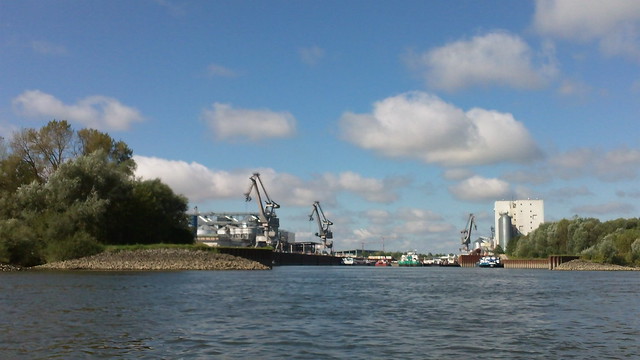
Aren’t we aware of the harm caused to these life-rich environments? Without floods, the plains die and we have to fertilise them with chemical product. What about fishes? At last, sooner or later the embankments fall down, causing real damages.
All of this just for the stubbornness to live in places unfit for human settling. If I sit for a coffee behind a dangerous bend, I know there will be some chances to be hit by a truck… What’s the solution? Building a brick wall or switch on the brain? Funny to say, we call ourselves Sapiens! Franny Armstrong’s right, we live in the Age of Stupid.
 Well, after this sermon in a true Cato the Censor fashion (please forgive me), let’s get back to the journey. The Danube has a wonderful, steaming water: Warm when the air is still cool!
Well, after this sermon in a true Cato the Censor fashion (please forgive me), let’s get back to the journey. The Danube has a wonderful, steaming water: Warm when the air is still cool!
We sail at 10 km/h when the wind is on our side, covering about 45 km up to Deggendorf, nice village with many colored houses and, I believe, world’s capital of tuning (these cars lowered and altered to give them an aggressive look, as well as conveying a little sweet Short Penis Syndrome.)
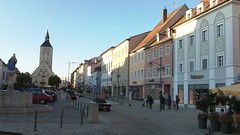 It’s Sunday, time to show off in the main town square. We’re guest in a nice marina hidden behind a river bend. In the morning, I sleep a little longer than usual, cuddled by the noise of a diesel engine coming from the nearby railway line. It takes to the freight port where the big ships load many goods, mostly cereals.
It’s Sunday, time to show off in the main town square. We’re guest in a nice marina hidden behind a river bend. In the morning, I sleep a little longer than usual, cuddled by the noise of a diesel engine coming from the nearby railway line. It takes to the freight port where the big ships load many goods, mostly cereals.
Today is bright and sunny, and the current is very good after the confluence with the Isar that has sped up quite a bit the green Danube. This is one of the best protected, greenest areas in Europe (a rare gem nowadays), an almost natural floodplain.
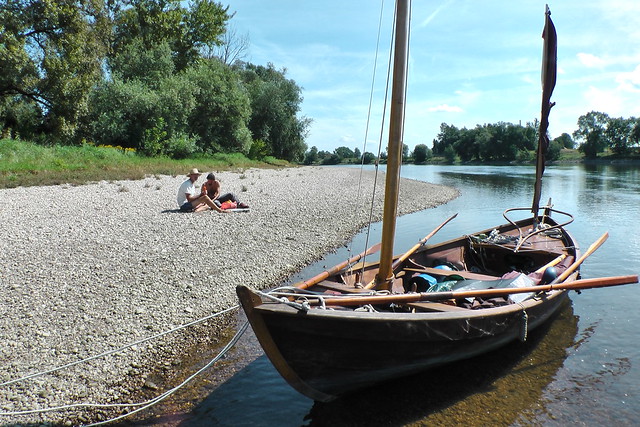
At noon, we decide to take a rest in a nice gravel beach. We eat local carrots, cheese and bread. A gentleman comes to take a look to Clodia, paying compliments: Franz is a rower and invites us to his Sailing Club, about 10 km down the river. The Club is perfect: They’re waiting for us and we’re taken for a quick tour. The members are currently committed in fighting a battle against the cuts of the Danube currently planned to favour an extensive commercial traffic.
This stretch, from Straubing to Passau, is one of the little ones left in Germany where the river flows free, without locks. And you can see it. Good luck! We cross a (river) current powered ferry, two canoeists, families and kids playing. A dreamlike athmosphere. Cars moved by a ferry that doesn’t pollute.
Nice idea or not? The driver didn’t seem a fool, but rather happy. The Danube is somehow hostage of money and gives money. Some people, such as Joseph, Mark and Matthias, struggle to keep it clean and healthy without cutting its meanders.
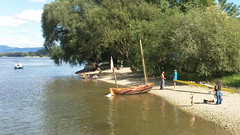 Nature never chooses speed, and loves diversity, not straight and embanked canals. The river must twist, create meanders, gets out from its bed, otherwise it dies like a man left laying in bed for a long time.
Nature never chooses speed, and loves diversity, not straight and embanked canals. The river must twist, create meanders, gets out from its bed, otherwise it dies like a man left laying in bed for a long time.
The afternoon is triumphant! The Danube turns into a river between rocks, once dangerous for navigation, and wonderful green valleys and trees. We sail for long. I write a message to Fine who will meet us in Passau, while Andrea’s rowing: Nobody watches ahead. I wonder why there’s a buoy in the river? So weird, and green also: Green brings bad luck aboard! A big thump.
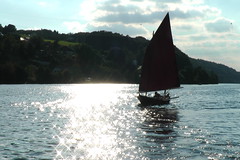 Clodia doesn’t sink: Lots of fear but the damages are minor, just a few scratches. Clodia is a great boat, I’m not a good steersman. Attention, always. It could had been dangerous, an impact at 12 km/h speed against an iron buoy!
Clodia doesn’t sink: Lots of fear but the damages are minor, just a few scratches. Clodia is a great boat, I’m not a good steersman. Attention, always. It could had been dangerous, an impact at 12 km/h speed against an iron buoy!
When we arrive in Passau, nothing’s missing! Beer and protection. We celebrate by breaking once again the rule of local food, but the hunger wins.
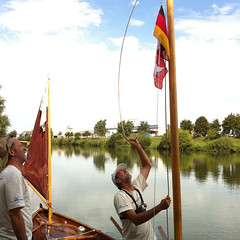 We’re nearly in the end of our German journey, that has given us many friends and as much water. Beauty and labour. A great, generous country, that’s teaching me a lot: It might still have to knock down a few walls to become even more beautiful and healthy. Ich liebe Deutschland. So much more now.
We’re nearly in the end of our German journey, that has given us many friends and as much water. Beauty and labour. A great, generous country, that’s teaching me a lot: It might still have to knock down a few walls to become even more beautiful and healthy. Ich liebe Deutschland. So much more now.
I’m now in Passau, wonderful city over three rivers. Andrea has gone back home, I’m alone in a nice, dark Cafè. I see Pantanegra hams hanging over my head, a Gardel tango as soundtrack, Italian food. There’re more men than ideas, said Marcel Proust. In Passau, three rivers, waters of three different colours blends, not before greeting each other though. And the Danube grows bigger. Blending is worth.
Varietas delectat, my granny used to say: She died at the age of 100, a smile on her face. Her first time in the hospital was also the last. But the time had come.
See you soon.
Giacomo and friends
























Ciao Giac, si, hai – purtroppo – trovato un esempio per le parole di Brecht! Spero che in Austria non troverai tanti esempi. Come state? Speriamo per voi – tantissimo – che il tempo faccia sempre meglio, remando avanti. Ma siete veloci!! Tutto bene a tutti voi, a presto! Abbraccio